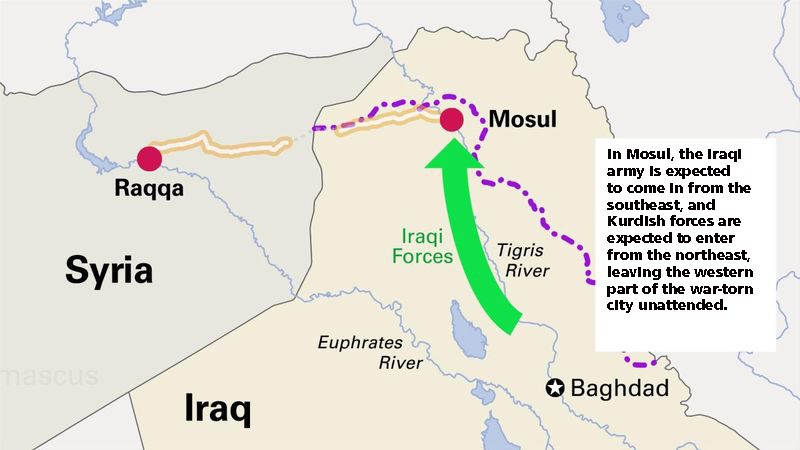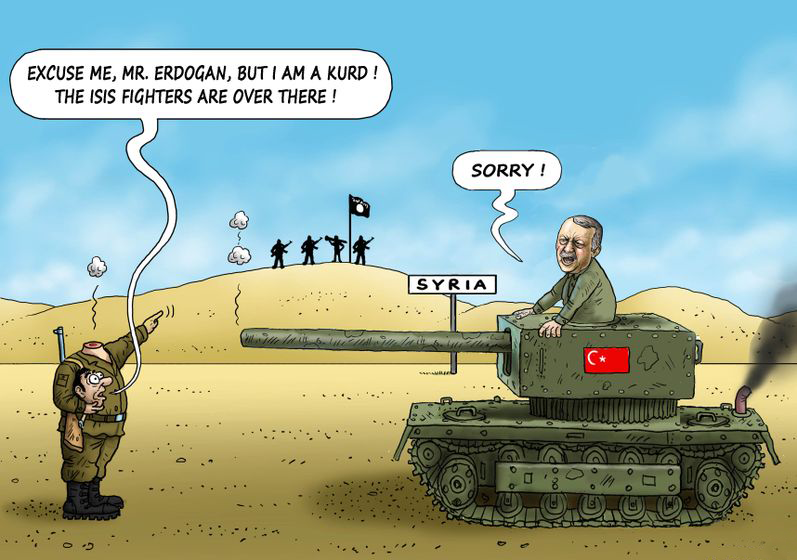From Mosul to Aleppo: folding the takfiri tent
Empowering Weak & OppressedTahir Mustafa
Safar 01, 1438 2016-11-01
Main Stories
by Tahir Mustafa (Main Stories, Crescent International Vol. 45, No. 9, Safar, 1438)
While the Iraqi army and Kurdish Peshmarga forces have launched operations from the southeast and northeast respectively into Mosul, the western corridor to Syria remains wide open for the takfiris to escape. Why?
As Iraqi forces backed by various militias make slow but steady progress toward the heart of Iraq’s second largest city, Mosul, troubling signs are beginning to appear on the horizon. The US has nearly 5,000 forces on the ground led by five generals, and is allegedly also providing air support to help Iraqi troops against the well-entrenched terrorists in and around the city, which has been under ISIS occupation since June 2014. Then there are French, Kurdish Peshmarga, and Turkish troops.
While Iraqi troops have liberated some villages outside Mosul, the city is not fully surrounded leading to serious concerns that the terrorists would manage to escape and make their way to Raqqa or even eastern Aleppo in Syria. This would be a deeply troubling development if it materializes since the terrorists would get an opportunity to regroup in Syria to continue the fight there after their members have come under intense pressure from Russian and Syrian bombing raids.
Russia’s Foreign Minister Sergey Lavrov expressed just such concern about the terrorists in Mosul when he said they could escape to Syria. Referring to operations launched against Mosul on October 17, Lavrov said, “The city is surrounded, but not completely. I do not know why. Possibly, they’ve just failed. It is to be hoped they just failed, and were not reluctant to do so.” The Russian foreign minister said Moscow would use military force to stop the takfiris from entering Raqqa or Aleppo.

It is quite intriguing to note that while the Iraqi forces are approaching the city from the south and southeast, the Kurdish Peshmarga forces are making their way from the north and northeast. The city’s western flank is still wide-open leading to speculation that the Da‘ish terrorists will be able to make their escape from there.
There are already reports that they have sent their families out of Mosul into Raqqa but are forcibly preventing the 1.2 million civilians from leaving. Have Iraq’s American advisors told them to let the terrorists escape if they want to, resulting in less fighting and, therefore, fewer casualties among Iraqi forces? This cannot be discounted. After all, the US is backing the terrorists in Syria under the spurious label that they are “moderates.”
The Iraqis may have been persuaded by this argument because their forces are not too competent despite optimistic statements by various officials claiming rapid military progress around Mosul. When some 5,000 terrorists first made their entry into Mosul in June 2014, the 20,000 or more Iraqi troops there, trained for years by the US, far from defending the city, abandoned their posts and fled. Has the Iraqi army made so much progress in two years to be able to take them on now?
Further, Iraqi troops are dependent on American air support (the US refuses to provide them planes or helicopters). The terrorists have resorted to their favorite tactic: suicide bombings. At least nine suicide trucks have been sent in the direction of the approaching Iraqi troops, eight of which were blown up before they could reach their targets. Only one exploded near the troops. The takfiri terrorists are also using drones to monitor Iraqi troop movements. One wonders how they get hold of the drones.
The presence of Turkish forces operating around Mosul without Iraq’s permission has complicated the situation. What is Turkey’s game? The central government in Baghdad has demanded Turkey pull its troops out of Iraq, but to no avail. Turkish President Recep Tayip Erdogan claims he has an agreement with the Iraqi government to train Kurdish forces, a claim vigorously denied by Iraqi Prime Minister Haider al-Abadi. On October 22, Turkish Prime Minister Binali Yildirim admitted as much. Speaking at a conference of his ruling Justice and Development Party (AKP) in the western city of Afyonkarahisar, Yildirim said, “In recent days, there have been warnings from Iraq. We will not listen to this, nobody can tell us to not be concerned about the region.” It is one thing to be concerned, quite another to barge into another country and illegally occupy territory by stationing troops there.
“The Iraqi leadership is being provocative,” Yildrim thundered at the AKP conference. “Turkey does not bow to anyone’s threats. Turkey will continue to be present there,” he added. Turkish military forces are in Bashiqa military camp, located some 12km northeast of Mosul.
When the Iraqi premier called on Turkey to withdraw its troops from Iraq, Erdogan dismissed him as nothing more than an “administrator of a Shi‘i army.” He then revealed what was on his mind, “If we say we want to be both at the table and in the field, there is a reason.” And what is that reason? Harboring ambitions of the revival of the Ottoman Sultanate, Erdogan wants to have a say in how Mosul will be administered. For this purpose, he is using the “Sunni” card.

He has staked his claim to represent the interests of “Sunnis,” who constitute the majority in Mosul. “They say 30,000 Shi‘i militants are coming. They should be prepared for what they will face,” the Hurriyet newspaper quoted Erdogan as saying (October 18).
It is a dangerous game and one that the central government in Baghdad must work hard to avoid. Like the Sunni extremists, there are also Shi‘i extremists and unless Baghdad acts with great care, it could walk into a trap. Mosul may be liberated from the clutches of the takfiris only to be engulfed in a sectarian fight, with Turkey actively aiding and abetting the Sunnis there. The Saudis are also anxious to stoke sectarian tensions.
Erdogan’s other obsession is with the Kurds, especially those in Turkey represented by the Kurdistan Workers Party (PKK) against whom he has launched a war. Turkey’s war on the Kurds — Ankara refuses to recognize them as a distinct group, insisting on calling them “mountain Turks” — is one of those tragic and sordid affairs that has caused tens of thousands of deaths on both sides. He is also chafing over the Kurds’ occupation of Manbij in eastern Syria. He has vowed to remove the People’s Protection Units (YPG) — a Syrian-Kurdish militia — from the city that is situated on the road to the Syrian-Turkish border.
He wants to prevent the Kurds in Syria from linking up with those in Turkey. Unfortunately the Kurds are also playing for short-term gains and have allowed themselves to be manipulated by the imperialists and Zionists for vague promises of help to achieve their political (statehood) goals. The Kurds have historically allowed themselves to be used by external powers with tragic consequences for the Ummah.
Statements out of Ankara are a bundle of contradictions. Erodgan wants to overthrow the elected government of Syria headed by President Bashar al-Asad, a policy that has demonstrably failed. His Prime Minister (Yildirim) says Turkey would like to work with Damascus. In his latest outburst on October 18, Erdogan called on the US to better assess Turkey’s position in the Mosul operation and reiterated that Ankara would be part of the offensive.
He reminded the US that Turkey was a NATO member. “Do you have a NATO partnership with Iraq? No. Then you can’t put us in a position of preference against Iraq. You said Afghanistan. Was it Iraq that walked with you [in Afghanistan]? Did countries other than NATO allies join in the Afghanistan [war]? It was us carrying out this struggle with you.” That “struggle” achieved little tangible results but that is a different matter and Turkish troops have long abandoned the scene.
Turkish media reports say that Ankara is also in discussions with the US for a possible joint operation against the takfiri terrorists in the Syrian town of Raqqa. The problem is that neither the US nor Turkey is really serious about fighting the terrorists. If they were, both would cooperate with the Syrian Army as well as Russia that are involved in carrying out air strikes against the takfiris in Aleppo. Instead, the Americans and Turks are shielding the terrorists by giving them different names when one group gets exposed as having committed heinous crimes. They simply change its name to keep the fiction of the “moderate rebels” alive. From Jabhat al-Nusra, Ahrar al-Shams to Jaysh al-Fatah and Fatah al-Sham, etc are labels of convenience. In reality, they are terrorists out to destroy Syria and Iraq in the service of their imperialist and Zionist masters.
What is common between Ankara and Washington is that both want to overthrow al-Asad. Erdogan also wants to create a “safe zone” covering some 5,000km2 in northern Syria that Ankara will use to smuggle arms and mercenaries in the war against the government of Syria.
There is also another perspective on the evolving situation in Mosul and Aleppo outlined by ‘Abd al-Bari Atwan, editor of Ra’i al-Yawm in his October 20 piece titled, “Aleppo-for-Mosul.” Atwan’s argument is that a trade-off has been agreed between Russian President Vladimir Putin and his Turkish counterpart Erdogan. Under this deal, agreed on October 18, Aleppo would be left to Syria and Russia to deal with while Iraq, the US and their allies would be given a freehand in Mosul. Turkey would be allowed to deal with the Kurds. The terrorists in eastern Aleppo (estimated to be about 900 in all) currently wearing the Fatah al-Sham label (formerly Jabhat al-Nusra and before that al-Qaeda) would be provided safe exit out of that part of the city to go to Raqqa.
We need to keep in mind that Atwan is one of the best-informed commentators about the region and has close contacts with key decision-makers there. It will be interesting to see how the situations in Mosul and Aleppo evolve. While the Iraqi army may be able to liberate Mosul eventually as it did Fallujah and Tikrit before, this will not solve its problems unless Baghdad makes serious efforts to avoid sectarian conflict. Similarly, pressure on the terrorists in Aleppo and Raqqa must continue in order to fold the takfiri tent, once and for all.
The coming days will tell whether these objectives will be realized. If Atwan’s theory is correct, the Fatah al-Sham terrorists will all move to Raqqa — their second capital after Mosul — to continue the fight that is increasingly beginning to look like a lost cause.

